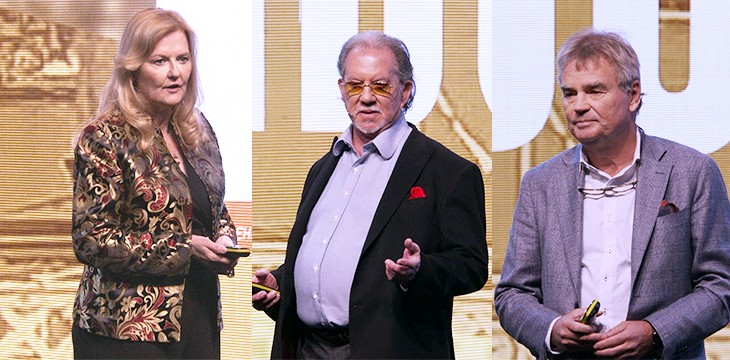|
Getting your Trinity Audio player ready...
|
One of the biggest announcements at CoinGeek London 2020 was EHR Data Inc.’s decision to partner with nChain and use the full power of the Bitcoin SV (BSV) blockchain to immutably store and manage healthcare data. After their presentation, CoinGeek’s Johanna Botta caught up with three leaders of the project to find out more about their project, and why they chose BSV.
During their 35 minute presentation, EHR Dara Inc and PDX Inc. Chairman and Founder Ken Hill, PDX Inc. Chief Clinical Officer Cheryl Jorgenson, and Deadalos Inc. President Ron Austring explained that the American health care system currently silos off data. That creates blind spots for healthcare providers, and takes ownership of personal data away from the patient.
A symptom of this system has been the opioid crisis. With doctors and pharmacies unable to cross reference what a patient has been treated for previously, a patient can be over prescribed pain killing medicine, causing or reinforcing a dependency on drugs.
By immutably recording all patient data to the BSV blockchain, the silos are done away with. Doctors, pharmacies, insurance companies and more can all check the same records, and patients don’t lose access to any of it once it enters the system.
To understand the concept of this system, Botta spoke with Ken Hill. “EHR is a term that is used in the United States for an electronic health record,” he explained. “We decided to work with nChain to get a connection between the data and Bitcoin SV through smart contract. The reason for doing that is to put the patient completely in control of their health care data.” (35:24)
This is a big money business, and one that needs an enterprise solution. “Data in the United States today is looked at as an economic benefit that every hospital, every physician, every insurance payer, every pharmacy benefit manager, every chain,” Hill said. “And when you think about these silos, every one of those groups that I just mentioned is making hundreds of millions of dollars off of the patients data. Now I’ve got a question for you. When’s the last time you got paid for your data?” (36:06)
To understand the medical side of the business, Botta checked in with Cheryl Jorgenson. “So desperate systems of health care information on patients will now be brought from siloed information into one single record of truth,” she said. “And that data can then be accessed to take care of that patient, right? Can’t really look at a patient and try to diagnose when you only have pieces of the information. Having it all together, that one record, is going to not only save lives, but increase patient safety.” (37:13)
Speaking specifically about the opioid crisis, Jorgenson saw adoption of BSV as the easiest way to get everyone on the same page. “We really do believe that the opioid crisis is going to really open the door to allow all healthcare data to be brought together. The opioid epidemic, it is a crisis, and there’s nobody out there that’s going to object to having a patient’s data all together. (38:06)
But there’s a core belief at EHR Data that the patient should ultimately be in control. “Because we believe that the patient owns their data, and why not incentivize them with rewards on the utilization of their data.” (39:34)
Finally, Botta checked in with Ron Austring to understand why the team chose BSV for their important work. “When we looked at all the different blockchains that were available, right, we looked at doing it with a private blockchain,” he said. “That didn’t really work for us because our industry is kind of famous for a few key players taking control of the situation. So it would get very political, very fast, right? So we decided, if we’re going to have this opportunity, we’re going to do this on a public blockchain so that is completely independent of our business. That was the big reason why going with BSV, and when you go public, there’s very few options out there, I think the only one right now is Bitcoin SV.” (39:55)
But while many blockchains are public, only BSV offered the ability to scale that EHR Data required. “Because in the end, when we’re processing all the prescriptions in the United States, we’re going to probably, it’s 4.2 billion prescriptions in the United States that get filled every year,” he said. “That’s going to generate 16 billion to 32 billion Bitcoin SV transactions. So when you look at those numbers, right, it’s an amazing rate, we’re talking 5-6 thousands transactions per second, right? So it’s huge, and that’s why we went with Bitcoin SV.” (40:47)
If the choice of BSV was ever in doubt, the professional and talented team at nChain sealed the deal. “What we needed was an enterprise solution,” Austring said. “And you also have the Chief Scientist on board is the inventor of Bitcoin, so it doesn’t get any better than that, right? Also, we visited, before we made any commitments with nChain, we visited the offices here in London, and what we discovered was just a huge group of people there that, very smart people, and a diverse set of skill sets. And it’s just, to us, they’re enterprise grade.” (41:24)

 02-16-2026
02-16-2026 




